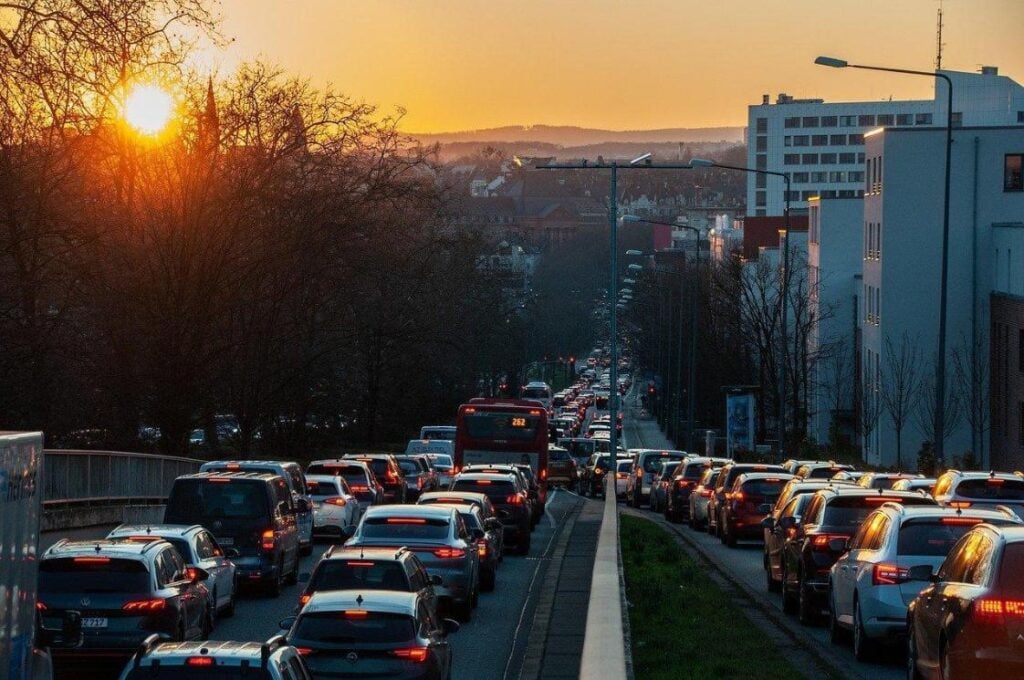Disclosure Sponsored Links: This post contains a paid-for sponsored link, meaning we have received compensation in exchange for including it. Sponsorship does not influence our content, but we believe in transparency regarding paid placements.
Do you know why certain roads experience persistent traffic snarl-ups, whereas others have traffic flowing smoothly all day?
Besides normal factors like rush hour and multiple security checkpoints, painfully slow traffic can be due to inadequate professional input in planning the number of vehicles flowing through such roads.
Traffic engineering consultants are some of the top professionals involved in ensuring the seamless flow of automobiles along our streets and highways. But how do they deliver on that seemingly demanding role?
Read on as we dissect the job description of a traffic engineering consultant and how to become one.
 Photo Credit: Pixabay.com
Photo Credit: Pixabay.com
Table of Contents
Who Is A Traffic Engineering Consultant?
Traffic engineering consultants are professionals whose core mandate entails designing and evaluating a country’s traffic systems and facilities. They’re also known as transportation consultants or simply traffic engineers.
While civil engineers are credited for actual road construction, their traffic counterparts are responsible for planning the volume of automobiles that pass through such roads.
Traffic engineering consultants aren’t just concerned with designing traffic systems in busy freeways. Their expertise is also critical in ensuring efficiency at city streets and intersections.
For instance, traffic engineers may recommend restricting the volume of heavy-duty trucks passing through downtown. That can help to minimise traffic snarl-ups around city centres while improving the safety of sensitive government buildings and installations in such areas.
Core Responsibilities of a Traffic Engineering Consultant
1. Designing Traffic Systems and Facilities
Before constructing or launching a road, traffic engineers must weigh in and recommend the volume of automobiles that can safely flow through these motorways at a given time.
A traffic engineering consultant’s input is necessary in averting unnecessary traffic jams, which can adversely slow down a country’s economic productivity. They also play an indirect role in enhancing security on the roads by minimising crimes like mugging and carjacking, which thrive in chaotic traffic scenes.
2. Evaluating Transportation Systems and Network
A traffic engineer’s role doesn’t end with the construction or launching of a road. Instead, these professionals play an active part in maintaining a country’s motorways. They may recommend significant traffic changes to certain streets and freeways from time to time.
Let’s say the President is scheduled to visit a busy city during rush hour. Security agencies may enlist the expertise of traffic engineering consultants to determine the fastest and safest routes the visiting head of state can use from the airport.
 Photo Credit: Pixabay.com
Photo Credit: Pixabay.com
3. Designing Essential Traffic Warning Systems
Traffic engineers aren’t only concerned with regulating the volume of traffic flowing along certain motorways. While that may be necessary under special circumstances, these consultants also improve efficiency in the transport industry by designing key traffic warning systems.
A traffic engineer plays an active part in designing road signage, signals, and traffic lights.
4. Collecting and Analysing Traffic Data
As traffic engineers are involved in the day-to-day planning and maintenance of transportation networks, they require accurate data to make informed decisions.
Traffic engineers may collect auto accident data over time and utilise such information to develop key strategies in the transport sector. Were the statistics majorly due to traffic gridlock or invisible road signs? Were motorists or pedestrians primarily to blame?
These are some of the questions that will inform a traffic engineer’s recommendations.
A traffic engineer may also gather data on other critical transport-related aspects, such as road signage distribution and pedestrian connectivity.
5. Working In Collaboration with Other Stakeholders
Traffic engineers don’t operate in isolation. Instead, they work closely with other stakeholders in the transport industry.
Sometimes, traffic engineering consultants perform specific roles in a transportation agency or project. Other times, their roles overlap with other industry stakeholders.
A few professionals that traffic engineering consultants often partner with include;
- Civil Engineers – Responsible for road design and construction.
- Traffic Planners – Formulate long-term transportation policies.
- Traffic Analysts – Professionals specialised in collecting and analysing traffic data.
- Traffic Manager – Coordinates and oversees traffic operations of a transportation agency.
 Photo Credit: Pixabay.com
Photo Credit: Pixabay.com
Skills Required To Become a Traffic Engineer
1. Data Analysis
The ability to gather, analyse, and interpret data is central to becoming a traffic engineering consultant. In most cases, these professionals rely on cutting-edge software to collect and interpret traffic data.
2. Predictive Analysis
Traffic engineers must also be able to forecast major developments in the transport industry. That often requires using reliable models and traffic simulation systems.
3. Report Writing Skills
Traffic engineering consultants must write and present reports to relevant authorities occasionally. As such, they require excellent communication skills and high self-esteem to articulate issues clearly.
4. Computer Savviness
Needless to say, traffic engineering consultants must be computer-literate. They specifically require skills to manipulate data analysis programs like Excel and ArcGIS and computer modelling software like Synchro, TransCAD, VISSIM, and HCS.
5. Other Soft Skills
Since they partner closely with other stakeholders in the transport industry, traffic engineers must possess teamwork, problem-solving, and project management skills.
As for academic qualifications, a Bachelor’s degree in Civil Engineering, Urban Planning, Transportation Engineering, or a related field is a minimum requirement.
 Photo Credit: Pixabay.com
Photo Credit: Pixabay.com
Final Word
Traffic engineering consultants play a critical role in enhancing the smooth flow of vehicles along busy streets and freeways, minimising road accidents and incidents. Through their expertise, these professionals maintain order in what could have been chaotic road scenes.
Suppose you’ve always harboured ambitions of becoming a traffic engineering consultant but didn’t know where to start. In that case, we hope this post provided you with the invaluable information you require to launch your career.








